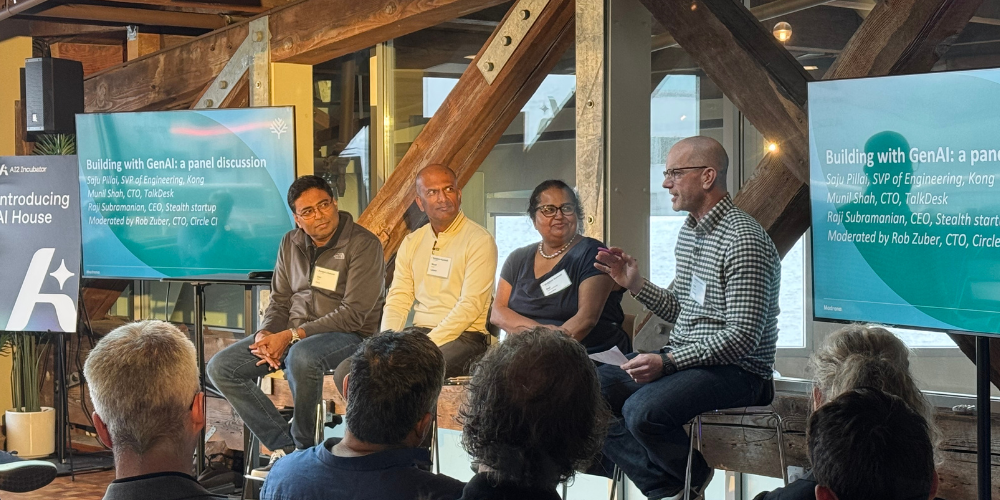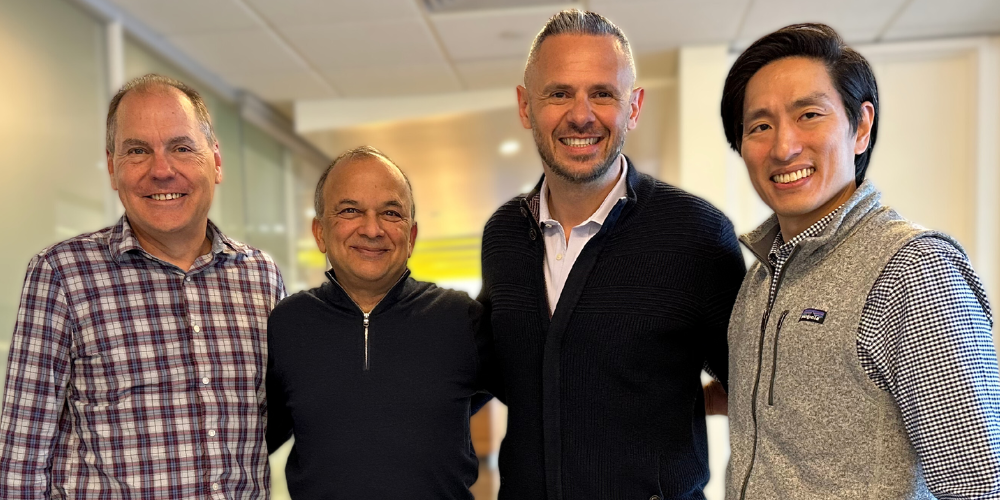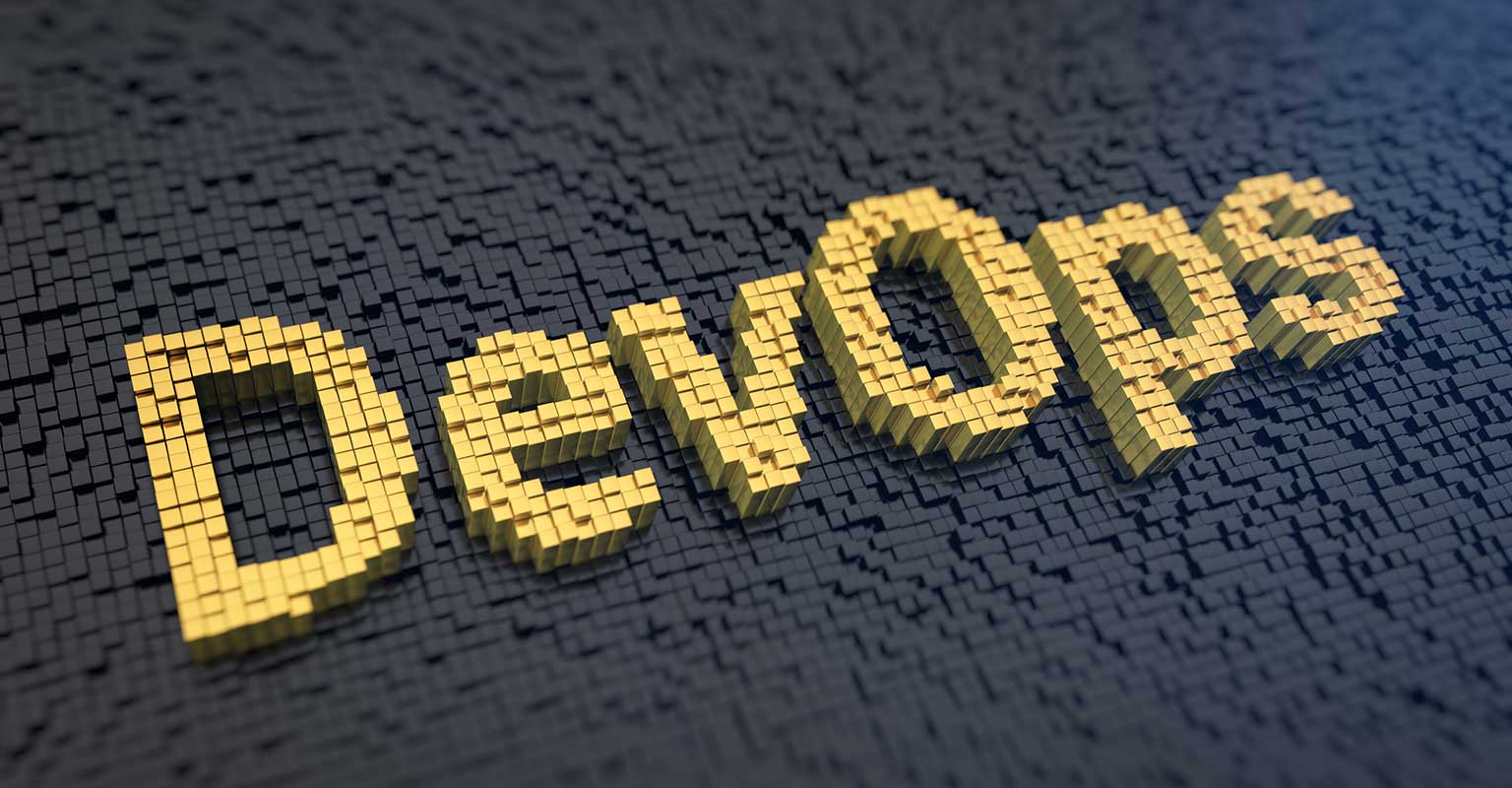How is GenAI reshaping software engineering? What should I be doing differently right now? We hear a lot about codegen, but how will the product lifecycle evolve? How different will my organization look in a few years than it does today? How should I be preparing for that future?
These are all great questions as we are in the midst of a transformational time. We’ve seen significant transformations in how we build software before (continuous delivery, cloud native architecture …) but assert this will be the most significant we’ve ever seen. As we heard these questions from leaders, we decided that leaders were also the best people to discuss the answers. This led to our most recent Madrona Builders Summit on May 15th, where we explored these questions (and more) with 100+ engineering and product leaders.
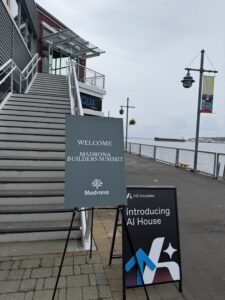
We were fortunate to have an incredible lineup of speakers, including leaders from CircleCI, Kong, TalkDesk, QA Wolf, and AWS. We designed the agenda to get perspectives from those building GenAI product development tools and from experienced leaders (from different stages of companies) who are working through this transformation. With more to come in future posts, we’ll summarize some of our key takeaways from the sessions and our pre-event survey.
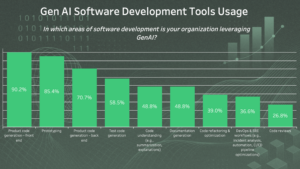
The entire product lifecycle will transform
Naturally, much of the discussion starts with codegen but there’s a lot of opportunity elsewhere in the product lifecycle where these tools can reduce toil from tasks that distract from the creative aspects of software development. You’ll see from the survey how companies are already using tools for other parts of the lifecycle. There is some surprise in the relatively lower use for test code generation – a task that developers have always looked to avoid. The speakers talked about how they saw the bottlenecks shift as codegen was adopted – both Rob Zuber, CTO of CircleCI and Saju Pillai from Kong reflected that the current bottlenecks in their teams were now on code review, not code development. You’ll see in the survey results how prototyping is a lead use case which is logical given the issues with developer trust and accuracy of codegen, but this also reflects the huge opportunity to completely reimagine how we prototype and specify the requirements for new capabilities. Munil told a story of how one of his technical product managers prototyped an entirely new feature using GenAI tools to the point they could share it with design partners — without any dev engagement. It’s clear that the end-to-end cycle of product development is going to change to adapt to where and how GenAI tools can help.
In order to fully exploit the opportunities in this new world, assumptions have to change
Many of the leaders spoke about how the developers most productive with GenAI tools had essentially changed their entire workflows. One of the most thought-provoking statements from the day was from Rob, who essentially said “we should rethink how we build code based on what these tools are great at versus making them fit into the structures that worked best for humans.” In other words, don’t divide code into units that are easy for a human to develop and maintain—rather divide code into units that are easy for a GenAI tool to generate and re-generate when you need to. All of this reinforces how big a transformation this will be for individuals and teams in how they operate.
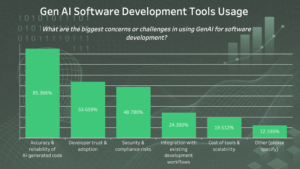
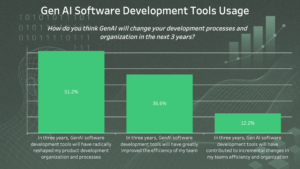
Leaders are going to have to lean into this transition if they are going to make the most of this
Any transformation like this is going to bring emotional resistance in addition to the real technical issues from things like hallucinations, security, and IP provenance that must be overcome. We’ve seen many times before in the tech industry how automation brings powerful benefits while battling real concerns about job security and career trajectory for those in the pathway of these changes. It was very interesting to us to see that most of those surveyed believe this will radically reshape their organizations and processes. While it is too early to predict what shape this will take, we generally believe that companies will do what they’ve always done, which is to preference velocity over cost savings. It is also our belief that those that lean-in to the concerns and limitations and ‘figure it out’ are going to do much better than those that ‘wait and watch’. This posture holds true for individuals as well as leadership and organizations.
Organizations leaning into this are already thinking about how to recruit and evaluate talent differently
Raji Subramanian spoke of the shift from evaluating coding and problem solving to “more of the soft skills” of critical thinking. Munil Shah, CTO of Talkdesk spoke about how they have changed their interview loops to split it between traditional coding interviews and problem solving — where with the latter they are encouraged to use any tool at their disposal to solve the problem. As roles and organizational structures change, you will need to recruit people who can fit into these new patterns and adapt to the rapidly changing world around us.
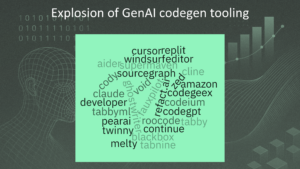
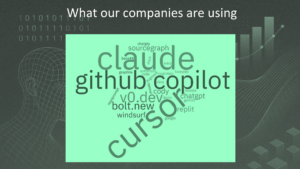
A complex landscape for codegen is consolidating as “appgen” emerges
There is no doubt an explosion of options for codegen with even more emerging, however our survey showed some clear consolidation around Cursor, Github CoPilot and Claude. When asked about standardization, most companies had standardized on multiple tools within a common framework with “developer choice” being not far behind. Within that, there were several mentions of “appgen” offerings such as Bolt, Lovable, and V0.dev – the emergence of these tools is already dramatically affecting the prototyping loop as well being applied to assist in front-end codegen. The effect on prototyping and iteration may be one of the most important velocity levers for product teams, especially during the product-market-fit journey.
That’s it for now – stay tuned for more content on this topic in the future as there were so many thought-provoking and inspiring moments from the event. Thank you to our speakers, the amazing Madrona events team and everyone who attended. We look forward to seeing you at our next Madrona Builders event!
